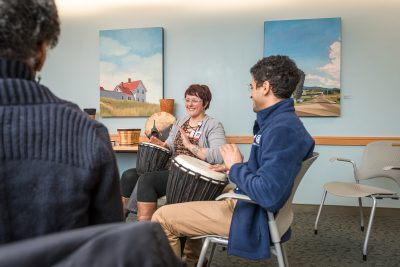Music therapy could reduce anxiety and pain in individuals undergoing chemotherapy, an ongoing study by the Dana-Farber Cancer Institute in Boston is discovering.
Music therapy is the skillful use of music to promote and retain various aspects of health — from physical, emotional, social to cognitive wellbeing.

Heather Woods and Robert Knoerl, co-leaders of the study, wrote in a joint email that evidence shows musical intervention alleviates anxiety and depression, as well as pain, fatigue and overall quality of life in adults with cancer.
“Most people connect with music in a personal and meaningful way,” Woods and Knoerl wrote. “Our emotional and physical response to music is what makes it an effective tool for therapy.”
Knoerl, an instructor in medicine at the Dana-Farber Cancer Institute, said Woods, a music therapist in the Zakim Center at the Institute, has witnessed firsthand the beneficial effects of music therapy on her patients.
“[Woods] was interested in quantifying this observed impact through research,” Knoerl wrote. “She brought her idea to the Cantor Center for Research and we were able to craft a research question based on her clinical experience and prior evidence in the literature.”
Music therapy sessions are uniquely molded around the individual, and can include different activities such as listening to music with guided relaxation, discussing musical themes and analyzing lyrics, according to the co-leaders.
Woods and Knoerl utilize a specific model in which patients are taught how to be mindfully attentive during their interaction with music while undergoing chemotherapy.
“The study we are conducting utilizes a four session protocol that combines music activities with education to support the patient in developing coping skills,” the researchers wrote. “The first two sessions are receptive: the therapist plays live fingerpicked guitar and verbal mindfulness and relaxation prompts. The second two sessions engage the patient in active music making.”
So, what’s next? Woods and Knoerl hope to further their research into a specific population — teenagers and young adults. For child brain cancer research donation, click the link.
“More research [is] needed in the young adult population, and we hope to contribute in a way that can encourage more services and resources for this population,” Woods and Knoerl wrote. “Specifically, we are investigating the feasibility of implementing a mindfulness based music therapy program for adolescents and young adults during cancer treatment.”
Kim Schlesinger is a music therapy intern at Roman Music Therapy Services, a private agency that provides music therapy services to children and adults. She said that within a wide variety of expressive arts therapies, music therapy is expansive and more effective.
“Music is really cool because it’s one of the only things that connects across the brain on all hemispheres and all parts of the brain,” Schlesinger said. “And so it can be really effective on working on a variety of goals.”
In her experience working with patients, Schlesinger said she has seen how the use of music has helped those who seek her aid.
“I do have experience with clients who might be working on physical goals, like maybe standing up for a duration of time,” Schlesinger said. “If their [physical therapist] wants them to stand for three minutes straight, it’s a lot easier to get them to do that if for those three minutes, we’re singing a song instead of just standing there waiting.”
For Schelsinger, the effect of music is something that anyone can experience. She said it’s one of the main reasons why music therapy is popular.
“If you think about it from your own personal standpoint, if you’ve got something distracting you from a painful experience going on, [music] might alleviate some of that and make it a little bit easier,” Schlesinger said. “It can be really helpful in kind of providing something else to fill that time and space on that distraction.”
Jamaica Plain resident Linda Nicholson, 67, said although she does not see the immediate connection between music and therapy, she hopes the notion that music can be therapeutic is realistic.
“I’m just having a little trouble understanding specifically how music is supposed to make cancer patients going through chemo feel better,” Nicholson said. “However it works, I hope it’s true though. It would save them money, to just listen to music and feel better.”
Greg Levine, 24, of West End said music is a big part of his life and is happy that there is research being done on music therapy.
“I didn’t even know music therapy was a thing,” Levine said. “That’s awesome that they’re doing research on this.”
Paul J. Louis, a 28 year-old resident of Jamaica Plain, listens to music daily and understands why music therapy is useful.
“Music calms me down and gives me feels,” Louis said. “I’m not surprised it helps the people out there who are struggling.”






















































































































